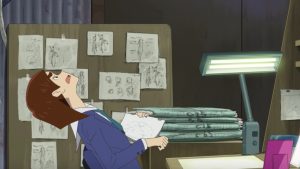 Four episodes into Eizouken ni wa Te o Dasu na! the thought that keeps running through my head is, how the heck did this ever work as a manga? To a larger extent than with almost any adaptation I can remember, this series’ charms seem overwhelmingly to spring from what the adaptation brings to it. Without the sound effects, the music, Itou Sairi’s performance, and most of all the animated fantasy sequences where is the appeal here? It’s not like the manga has ever been hugely popular or even that well-reviewed, but it’s a minor miracle someone saw enough in it to publicly suggest that Yuasa Masaaki should adapt it (and the rest is history).
Four episodes into Eizouken ni wa Te o Dasu na! the thought that keeps running through my head is, how the heck did this ever work as a manga? To a larger extent than with almost any adaptation I can remember, this series’ charms seem overwhelmingly to spring from what the adaptation brings to it. Without the sound effects, the music, Itou Sairi’s performance, and most of all the animated fantasy sequences where is the appeal here? It’s not like the manga has ever been hugely popular or even that well-reviewed, but it’s a minor miracle someone saw enough in it to publicly suggest that Yuasa Masaaki should adapt it (and the rest is history).
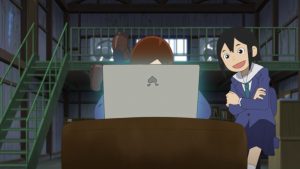 That said, we’re starting to get to a point with the anime I’ve seen a few times before, where any criticism of it is treated as heresy. The contrarian in me dislikes that for starters, but it’s a bad road to go down generally speaking. I continue to see a lot of irony – intentional or otherwise – in what’s happening on screen. You have a group of kids (basically a duo, really) making an anime with no plot just for the love of the process. That seems to me very much what Eizouken itself is, except the kids making it are young-at-heart grown-ups and they have the added bonus that the anime they’re making for the love of it is about making anime for the love of it.
That said, we’re starting to get to a point with the anime I’ve seen a few times before, where any criticism of it is treated as heresy. The contrarian in me dislikes that for starters, but it’s a bad road to go down generally speaking. I continue to see a lot of irony – intentional or otherwise – in what’s happening on screen. You have a group of kids (basically a duo, really) making an anime with no plot just for the love of the process. That seems to me very much what Eizouken itself is, except the kids making it are young-at-heart grown-ups and they have the added bonus that the anime they’re making for the love of it is about making anime for the love of it.
 The process itself is an interesting canvas to an extent, it’s true. I guess even high schoolers making self-promotion reels have to deal with the same quandary the pros do – that occlusion zone where perfectionism and principle meets budgetary and chronological reality. Heck, we even have a producer (and that, to be sure, is effectively what Sayaka is) to remind the animators of that. That means using digital to save time, compromising on the in-betweens, and sleeping under the desk. Just like the big kids dealing with production committees do.
The process itself is an interesting canvas to an extent, it’s true. I guess even high schoolers making self-promotion reels have to deal with the same quandary the pros do – that occlusion zone where perfectionism and principle meets budgetary and chronological reality. Heck, we even have a producer (and that, to be sure, is effectively what Sayaka is) to remind the animators of that. That means using digital to save time, compromising on the in-betweens, and sleeping under the desk. Just like the big kids dealing with production committees do.
 Make no mistake, though – no more than the fairy tale that was Shirobako is Eizouken trying to be a realistic depiction of the anime production process. But where Shirobako divorced from reality by pulling its punches and largely giving the industry a free pass for its business practices, Eizouken is simply a fantasy, period. How else do explain their audition video taking over the auditorium the way it did? It was fun to watch, but by executing what should have been the key scene in the first act of the series that way, Eizouken is unequivocally divorcing itself from any sense of real drama. I would have found it much more satisfying, personally, to see the girls win the student council over with their talent rather than having it happen by magic, but that doesn’t seem to be what this series is.
Make no mistake, though – no more than the fairy tale that was Shirobako is Eizouken trying to be a realistic depiction of the anime production process. But where Shirobako divorced from reality by pulling its punches and largely giving the industry a free pass for its business practices, Eizouken is simply a fantasy, period. How else do explain their audition video taking over the auditorium the way it did? It was fun to watch, but by executing what should have been the key scene in the first act of the series that way, Eizouken is unequivocally divorcing itself from any sense of real drama. I would have found it much more satisfying, personally, to see the girls win the student council over with their talent rather than having it happen by magic, but that doesn’t seem to be what this series is.
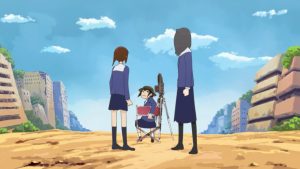 I’m pretty much where I was last week and the week before – entertained, but hoping that Eizouken ni wa Te o Dasu na diversifies its narrative portfolio because it’s already pretty repetitive. I love anime and I even like manzai well enough, but it sure would be nice to get a couple more characters and a new routine or two in the mix. Surely the film club will have to lift its game now that its story-free sample film has done its job and gotten them a budget – maybe Eizouken will be life imitating art and do the same.
I’m pretty much where I was last week and the week before – entertained, but hoping that Eizouken ni wa Te o Dasu na diversifies its narrative portfolio because it’s already pretty repetitive. I love anime and I even like manzai well enough, but it sure would be nice to get a couple more characters and a new routine or two in the mix. Surely the film club will have to lift its game now that its story-free sample film has done its job and gotten them a budget – maybe Eizouken will be life imitating art and do the same.


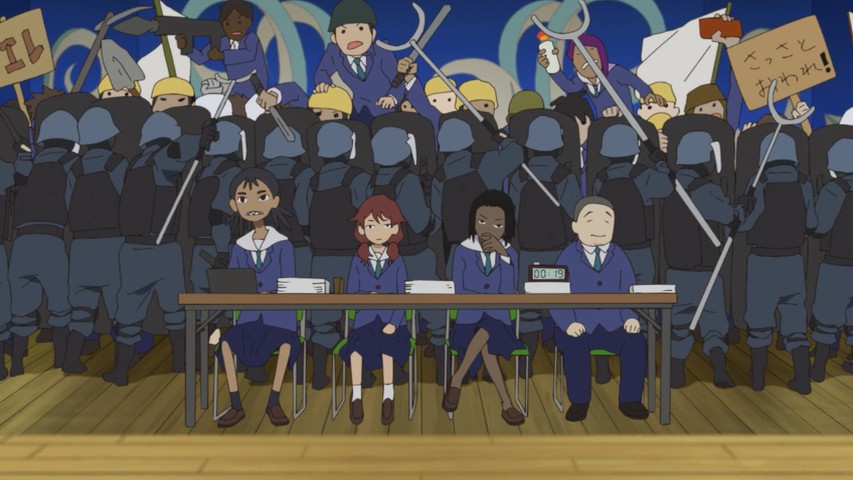

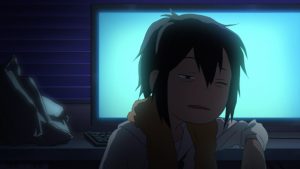


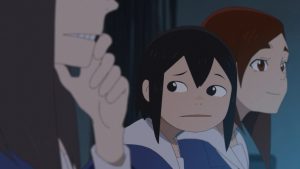
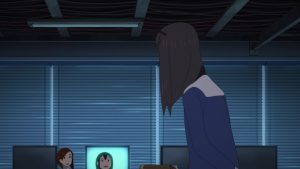
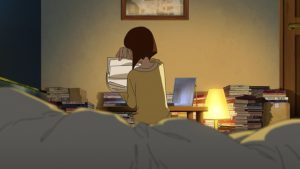

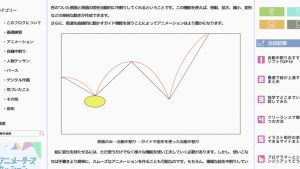
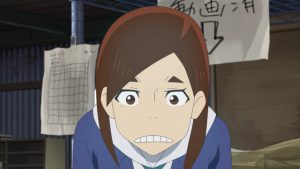
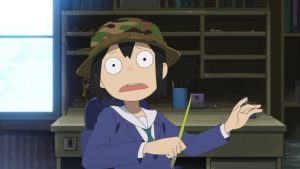


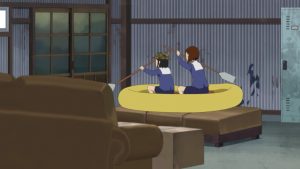
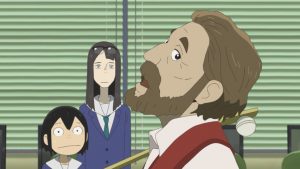
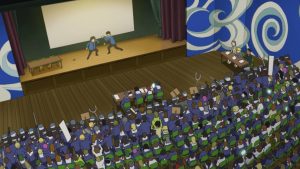
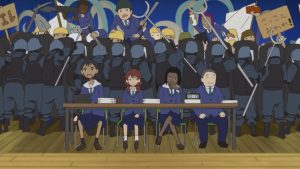
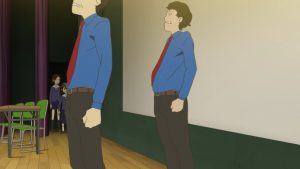
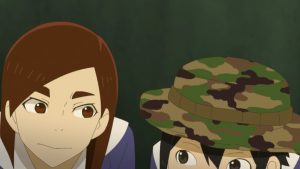
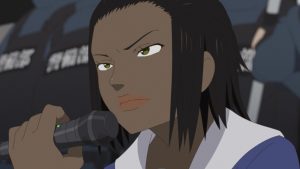
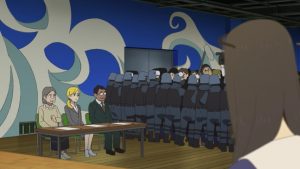
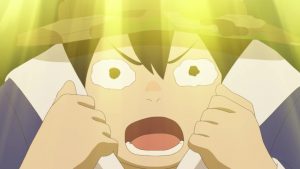
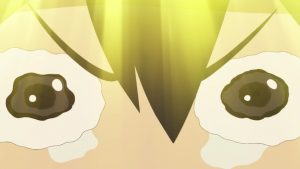
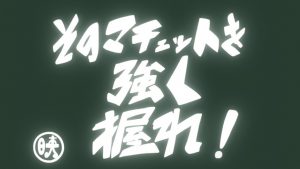



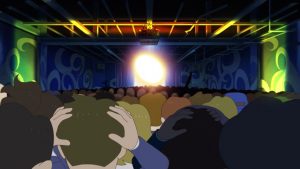

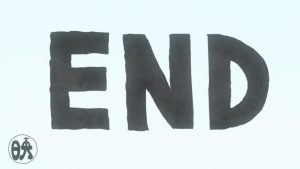
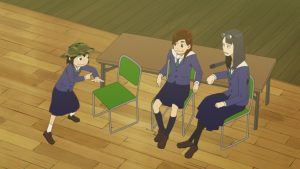
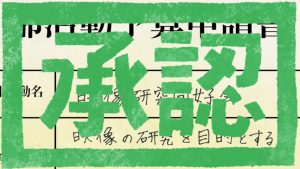

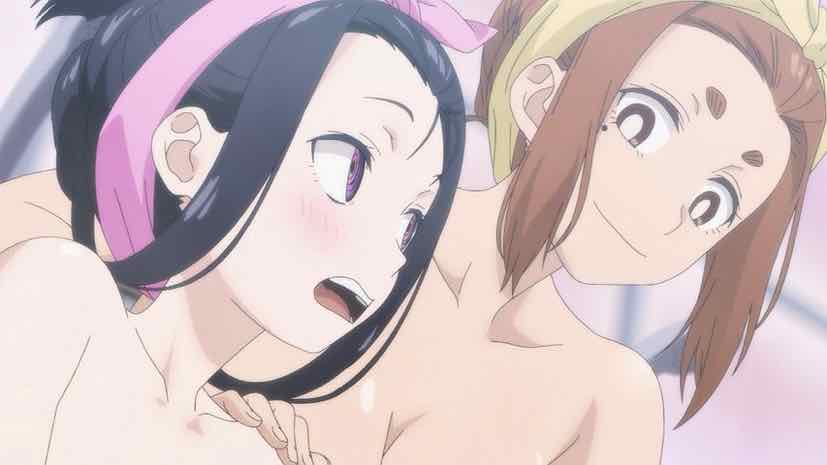
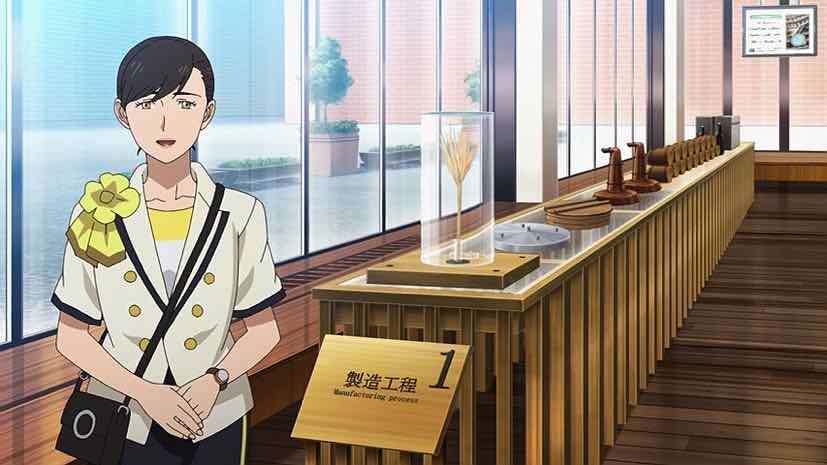
Simone
January 27, 2020 at 9:27 pmI get the impression Eizouken is shaping up to be, plot-wise, an educational anime. It tends to be a thing – pick one subject and put it into a plot, having audience proxies who learn and grow as a tool to show the ropes of the subject to us as well. It’s pretty much the mechanism at the core of every sports anime ever, but also stuff like Dr. Stone (chemistry, physics and engineering) or Cells at Work (biology and immunology). And here it’s being done for animation instead – not the industry in itself as much as the technical process. There’s also a lot of love for the medium in general, of course, and that’s the emotional side of it, with all the visionary sequences.
“How else do explain their audition video taking over the auditorium the way it did?”
Uhm… it was a visual metaphor? At the end the auditorium was intact. It just was a way to represent artistically that people were being blown away by the wonder of what they were seeing. A bit over the top perhaps for a 3-minute rushed high school club anime production, but it’s supposed to represent exactly what you asked for, the girls winning the audience over with their talent.
sonicsenryaku
January 27, 2020 at 10:45 pmWell said my guy
Litho
January 27, 2020 at 10:04 pmI, on the other hand, am hoping it stays the way it is (more or less) and remains fantastical. I feel it’ll simply lose it’s charm if it becomes too character-driven. Let me put it this way; I have little interest whatsoever in how anime is made*, even less interest about the realities of that particular industry, and am by default rather averse to anime about professions, hobbies or sport, and yet each episode of this simply flies by with me smiling through most of it. Haven’t had a single cringe/wince moment so far. That in itself is an achievement** in my eyes, and I hope the vibe continues through the end.
* I am curious about the sound design though. Wish they went into more detail about that.
** Yes, I don’t rate anime as highly as I used to, so the bar has been lowered somewhat, I admit.
Haraga
January 27, 2020 at 10:42 pmAs much as Yuasa’s team is incredible, they just can’t hide that the story is fundamentally kind of underdeveloped. And that’s the case for a lot of shows that I think are good but not great, when there is lots of visual narrative prowess, but not enough narrative substance and backbone that should ultimately come from the script.
sonicsenryaku
January 27, 2020 at 10:49 pmThe story is underdeveloped?? DO you feel that way because there isn’t an obvious surface-level narrative driving the events?
Guardian Enzo
January 27, 2020 at 11:12 pmHeresy!
Sonicsenryaku
January 28, 2020 at 12:42 amHERESY INDEED; PITCHFORKS AT THE READY!!! Sarcasm and jokes aside, i don’t know what kind of heresy you’ve been seeing in your discussions about this show, but if people are just disagreeing with you or hell, even telling you that you’re wrong, that’s not heresy at all. Someone going out of their way to disallow you from having a less than favorable opinion of the show just because they like it; that’s heresy. There’s a significant difference there, my friend. For example, you claimed last week that the characters are archetypical and are lacking substance. I highly disagree and I also think you’re wrong in that assessment as the three characters we have behave in ways that the definition and implications of the word archetypal, do not correspond with. I just think some of your views on the show are wrong, but I would hope you wouldn’t see that as someone thinking you’re not ALLOWED to feel the way you do about the show.
I disagree with Haraga’s assessment on the show’s narrative substance as well. While the show doesn’t have an obvious narrative map, that doesn’t mean its lacking narrative substance. I just want Haraga to share his/her thoughts a bit more as to why the show is lacking narrative substance for him/her. Challenging people’s opinions, even telling them that they’re wrong, ain’t heresy my friend. What would be the point of conversation otherwise, right?
Dop
January 27, 2020 at 10:56 pmI absolutely love the flights of fantasy that this show goes into. It’s really a great example of what’s known in the SF fandom community as “sensawunda'” (Sense of Wonder).
I was also glad the student council weren’t being arsey for the sake of being arsey, but recognised that the Eizouken had put in the effort and were taking things seriously, not just larking about. So they rewarded that.
Guardian Enzo
January 27, 2020 at 11:13 pmSense of wonder it has in droves, no argument. I’m not sure how much else it has but it definitely has that.
Marty
January 29, 2020 at 4:58 amMy two cents on the matter of “anime about the anime-making process” is that there’s two ways of going about tackling the subject:
1. You can go the “Shirobako” route and glorify the industry
2. You can go the ”Girlish Number” route and not be a total condemnation of the industry (no industry would be dumb enough to completely shoot itself in y he foot) but at least acknowledge some of the many things wrong with the industry.
I hate to say it, but the results speak for themselves, the former is recognized to be “one of the best of 2015” by many anime fans, while the latter is almost completely forgotten.
A lot more anime fans rather have a fantasy than face the reality of the industry.
Guardian Enzo
January 29, 2020 at 7:21 amI don’t disagree with anything you said, and it probably wouldn’t surprise you that between the two I prefer Girlish Number. When reality is unpleasant (see “Change, Climate”) most people prefer the fantasy over being reminded of the reality.
That said, Eizouken is thankfully not too bogged down by that. This is pure fantasy and unlike Shirobako, has little pretense to the contrary.
sonicsenryaku
January 29, 2020 at 8:42 amBut the people who love shirobako; the ones that love it deeply and have peeled back its layers, don’t love it because of its portrayal of the anime industry. Girlish;number wasn’t less successful because of its particular take on the anime industry either. Shirobako is loved by the many people that do because of what it has to say about pursuing your dreams and the way it highlights throughout its 24 episodes, the journey of doing whatever it takes to be a part of something you are truly passionate about; remembering what inspires you to keep going on whenever you become overwhelmed by the expectations of people, life, and your own ambitions. It’s that arousing message told through the lens of highly revealing and informative aspects of anime production that makes people revere the show as much as they do.
I see so many people bring up Shirobako’s clean portrayal of the anime industry as being a flaw of the show or present that aspect of the show as being antithetical to the show’s quality but i find that kind of logic to be a bit flimsy. I agree that the show takes a very charitable view of the anime industry (and to be honest, I would have loved if the show delved a bit further into the viscous mud that is the industry), but honestly, that has nothing to with the actual narrative of the show. I would have loved for Shirobako to emphasize the cruelty of the industries practices as a part of conflicts the characters faced; however, looking at the bigger picture, the show easily establishes conflict regardless of that cynical perspective by still showing us how much the cast struggles when they have to get an episode of anime before airtime, how those consequences affect their psyche, and the passion that drives the characters to continue onward despite all that. It’s not like the show ever lies about the industry and pretends like the problems within it don’t exist nor does it brush to the side those issues and solve problems through flights of fancy. Shirobako decides on a more optimistic view of working in the anime industry because the point is to communicate to the audience why people choose to work in it despite how grueling it can be. The industry may be shit and I think it needs collapse in on itself as soon as possible with the way its going (like it did before in the 60’s) so that it may be reborn anew with better practices, but people are passionate about creating art and still going to want to make their stamp through anime with or without the industry. Some of greatest auteurs of anime working in the industry are inspirations to up and coming animators and voice actors, and those legends inspire the new generations to want to become legends themselves. Shirobako doesn’t glorify the industry, it glorifies wanting to be a part of anime; it glorifies wanting to pursue your dreams; those are totally different things. Yes, some anime fans would rather have a fantasy than reality, but it definitely ain’t in regards to the industry, that’s for sure; the popularity/praise of shows like Shirobako vs Girlish number have nothing to do with that conjecture.
The anime industry may be shit, but there are reasons why people get into the anime business regardless; that’s Shirobako’s thesis and how it explores that is why there are fans of the show. Girlish number has a more cynical take to the industry, and what is has to say is just as valuable as Shirobako, yet more biting. However, if people find themselves resonating more with Shirobako, do you really think it’s just because anime fans would rather have a fantasy than face the reality of the industry? Or is it because human beings have a natural tendency to be drawn to stories that are uplifting and wholesome or cathartic as opposed to those that aren’t (or at least aren’t as obviously wholesome).
Guardian Enzo
January 29, 2020 at 11:30 amI think Shirobako knew exactly what it’s strategy was. Be ingratiating, get funded by a production committee, be popular. It played the game very smartly.
I would have less problem with Shirobako giving the industry a free pass if it didn’t try and pass itself off as a realistic portrayal of it (which Eizouken is not guilty of). By doing so, it contributed to the whitewash job the industry does regarding its own failings. It was smart in terms of ensuring its own success, but not so good for anime as a whole.
sonicsenryaku
January 29, 2020 at 11:05 pmThat’s a bit of a overly dramatic takeaway if you ask me. I don’t know man; I find that to be a super cynical look at the purpose of the show (almost conspiratorial in thinking, even) especially since Shirobako doesn’t give the industry a free pass; it just never delves into how bad the industry can truly get in the same way a movie like Satoshi Kon’s “Perfect Blue” does with exposing the utter toxic side of idol culture. Again, the show is just optimistic about its characters making it through the grueling machine of an industry through teamwork, camaraderie, and willpower. It celebrates those things as being necessary to keep shouldering on through life’s challenges; not that the people who come into the anime industry will have happy work lives. Shirobako definitely doesn’t try to blindside people with its cheerful message, especially since all a person would have to do to know the truth of the industry is simply pay attention to the tweets animators put out or just do the research.
Shirobako is essentially “anime pulling from reality.” It reflects realistic aspects of the anime production but i don’t think it ever strove to herald itself to its audience as a documentary of the industry. The anime strives moreso to tell a relatable story about having to deal with the day to day stresses of working a 9 to 5; breaking your head over responsibilities and deadlines and the struggles of coming to terms with the expectations of the adult world: THIS is the realistic portrayal the anime tries to pass itself off as; the anime industry only serves as a backdrop to share information with its viewers to some extent about the nature of anime production while making commentary on the industry. Even animators who have commented on Shirobako’s presentation of the anime industry and have said that while the working conditions of the main cast are more of the ideal than what reality actually subjects them to, it doesn’t shy away from showing how intense the workload can be (such as one of the characters sleeping at the job just to meet the deadlines).
Listen, I would be agreeing with you wholeheartedly on this whole matter if it wasn’t for the fact that Shirobako’s existence has empirical contributed NOTHING significant to the whitewash job the industry does regarding its failings (I would need to see some data or evidence to be convinced of Shirobako’s influence exacerbating these issues). Any other bullshit that has come about in the industry since has had nothing to do with the show. As a matter of fact, it can be easily argued that it’s because of shirobako that ignorant anime fans are now more aware of the shitty conditions animators go through in this industry; that it’s because of this show that animators started speaking up more publicly about how bad it can get working in this industry; that it’s because of Shirobako that anime fans started having a bit more sympathy for the plight of animators. The show motivated viewers to start looking into this shit; it didn’t delude them as they were capable of realizing that the optimism in the show was a function of the fictional story being told and not some ploy to make people fall for a fantasy of the industry. I’m sorry Enzo, but i definitely disagree with you on this one. Agree to disagree i guess